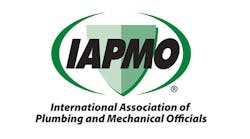Latest from Codes
Sponsored
ITASCA, IL — The American Supply Association, the only national trade association for plumbing, heating, cooling, pipe, and industrial pipe, valves and fittings distributors, their suppliers and independent manufacturers reps of those products, is part of a coalition that supports Colorado House Bill 1358, Clean Water in Schools And Child Care Centers, and is offering technical amendments that clarify the intent of this bill.
In a letter to Colorado Public & Behavioral Health & Human Services Committee Chair Dafna Michaelson Jenet and committee member The Honorable Emily Sirota, the coalition, which also includes International Association of Plumbing and Mechanical Officials (IAPMO), NSF International (NSF) and Water Quality Association (WQA), notes that lead contamination of drinking water poses known health risks, and even low levels of lead exposure can cause permanent cognitive deficits and behavioral difficulties in children.
To reduce the presence of lead in drinking water and combat these potential health threats, the U.S. Environmental Protection Agency (EPA) and Centers for Disease Control and Prevention (CDC) suggest using point-of-use filters tested and certified to comply with the U.S. national standard for water filters.
As such, HB 1358 appropriately requires drinking water filters to meet nationally recognized industry standards for lead reduction, NSF/ANSI Standard 53 for lead reduction and NSF/ANSI Standard 42 for Class 1 particulate reduction.
Language Clarification
Given that the bill also includes a use of lead-free fittings, the coalition suggests including the definition of “lead-free” from the federal lead law as outlined by EPA. These industry standards are referenced in building and plumbing codes throughout the country and provide uniform and consistent requirements in the marketplace designed to protect public health.
The coalition also recommends that the products uses in remediation efforts be certified by a third- party certifying body accredited by the American National Standards Institute (ANSI) National Accreditation Board (ANAB). This clarification will ensure the filters and fittings meet the relevant NSF/ANSI American National Standard for drinking water treatment units for lead reduction and perform as intended.
This recommendation aligns with federal government agency guidelines to remove lead from drinking water. It also underscores the need for independent product testing and certification as a critical step to ensuring that products meet the performance, health and quality assurance required by these regulations.
The coalition adds that third-party product certification can help the state provide consumer confidence that water filters and filtration systems will function as they claim, and help eliminate concerns that consumers may purchase and install either non-complying products or counterfeit products available on the market. It is important to note that there are numerous organizations accredited by the American National Standards Institute to provide this service.
Lastly, the coalition stresses the importance of notating that federal guidance by EPA and under the federal Lead & Copper Rule establishes an action level for lead to be 15 parts per billion (ppb). Although there is no “safe” level of lead, water filtration devices certified to NSF/ANSI standards for lead reduction have been verified to reduce lead to 5ppb or less, the coalition points out.
Currently, certifying bodies accredited through ANAB test and certify water filtration devices to remediate lead to 5ppb as prescribed under the standards NSF/ANSI 42 and NSF/ANSI 53 for lead reduction. There may be devices and filtration systems that claim to remediate lead below 5ppb, however, this is currently outside of the established and adopted NSF/ANSI standards against which products are tested and certified.
Therefore, the coalition recommends changing the 1 parts per billion requirement in the bill to 5 parts per billion to better align with the requirements for water filters to meet the latest version of industry standards. Along with requiring third-party certification, this change will help ensure that filtration devices used in remediating lead have been verified to do so.
The coalition strongly supports the intent of HB 1358 and appreciates the opportunity to collaborate on this vital water quality legislation.


